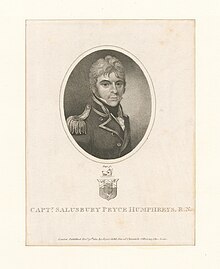Sir Salusbury Pryce Humphreys | |
|---|---|
 | |
| Born | 24 November 1778 Clungunford Rectory, Clungunford, Shropshire, England |
| Died | 17 November 1845 (aged 66) Cheltenham, Gloucestershire, England |
| Buried | Leckhampton, Gloucestershire, England |
| Allegiance | |
| Service | |
| Years of service | 1790–1845 |
| Rank | Rear-Admiral |
| Commands | HMS Prospero HMS Leander HMS Leopard |
| Awards | Companion of the Bath Knight Commander of the Guelphic Order of Hanover |
Sir Salusbury Pryce Humphreys KCH CB (24 November 1778 – 17 November 1845), later called Salusbury Pryce Davenport, was an officer of the Royal Navy who saw service during the French Revolutionary and Napoleonic Wars and the War of 1812, rising to the rank of rear admiral.
He entered the navy during the Spanish armament in 1790 and served aboard a number of ships, starting at the level of able seaman and rising through the ranks, having reached midshipman on the outbreak of the French Revolutionary Wars. A lieutenancy followed while serving in the Caribbean, where he acted in support of army operations against enemy colonies and islands, before his return to Britain. He was afterwards employed in the English Channel and North Sea, where he distinguished himself on a cutting out expedition off the Dutch island of Schiermonnikoog, narrowly escaping death when a ship he tried and failed to board suddenly exploded. After again supporting land operations, this time in Holland, he was promoted to commander though he had to then wait two years for a command.
Promotion to post captain soon followed, and he went to North America to command the flagship of the admiral in command there. Desertion from Royal Navy ships had become a pressing issue and Humphreys, by then in command of the 50-gun HMS Leopard, was ordered to intercept the USS Chesapeake, which was suspected to have several deserters as part of her crew. Humphreys did so, and requested permission to search her. Chesapeake's captain refused, so Humphreys fired upon her, the poorly prepared American ship surrendered and Humphreys took off several British deserters. The backlash from the Chesapeake-Leopard Affair, as it became known as, was severe. A political crisis was precipitated between the governments of Britain and the United States, and to mollify the Americans, Humphreys was given no further commands. He was already wealthy, having married an heiress, and settling at the estates of Bramall Hall. He was promoted to rear admiral in 1837, and then restored on the active lists, having changed his surname to Davenport in 1838 on the occasion of his wife's inheritance. He died in 1845.